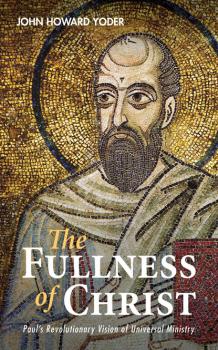ТОП просматриваемых книг сайта:















John Howard Yoder
Список книг автора John Howard YoderАннотация
Yoders Klassiker wurde von «Christianity Today» auf Platz 5 der 100 wichtigsten theologischen Bücher des 20. Jahrhunderts gesetzt. Kein Wunder, dass Autoren wie N. T. Wright, Shane Claiborne oder Brian McLaren davon inspiriert sind. Es wurde in zwölf Sprachen übersetzt und über 100.000 mal verkauft. «Zu meiner ersten literarischen Begegnung mit Yoder kam es, als ich mich intensiver mit christlicher Friedensethik beschäftigte. Einige meiner Überzeugungen hat Yoder erschüttert – mit Sätzen wie dem, dass es in der Nachfolge, die auf Gewalt verzichtet, nicht auf den Erfolg, sondern auf Treue ankommt. Das beantwortet nicht jede Frage, aber es hat mir Mut gemacht, auf der Suche nach Antworten in neue Richtungen zu sehen.» Prof. Dr. Christoph Raedel, Internationale CVJM-Hochschule in Kassel «Eine drastische Studie christlicher Sozialethik – bei diesem Thema hat mich niemand stärker beeinflusst als Yoder. Seine Kapitel ,Christus und die Macht' sowie ,Revolutionäre Unterordnung' sind schlicht das Beste, was zu diesem Thema geschrieben wurde.» Richard J. Foster
Информация о книге
Автор произведения John Howard Yoder
Жанр Документальная литература
Серия Edition Bienenberg
Аннотация
In A Pacifist Way of Knowing: John Howard Yoder's Nonviolent Epistemology, editors Christian Early and Ted Grimsrud gather the scattered writings of Yoder on the theme of the relationship between gospel, peace, and human ways of knowing. In them, they find the beginnings of a pacifist theology of knowledge that rejects strategies of empire while at the same time avoids a self-defeating relativism.
Аннотация
"Of very few people can it be legitimately said that their work fundamentally reconfigured the landscape of two theological disciplines. But if there is anyone in recent memory who would be worthy of such an accolade, it is John Howard Yoder. The two disciplines are, of course, theological ethics and biblical studies–though Yoder would cringe at their separation, and his work was both explicitly and implicitly a prolonged exercise in maintaining their indissoluble union. For him, to hear the word rightly was to do the word publicly. . . . [Yoder] guides us toward a truly ecclesial yet missional reading of Scripture, with a profoundly Anabaptist yet ecumenical and catholic spirit, in historically astute and literarily sensitive ways that are nonetheless «straightforward» and pastoral. Or, as he would himself say, he guides us toward a reading of Scripture that proceeds from and focuses on Jesus: Vicit Agnus Noster, Eum Sequamur; 'Our Lamb has conquered; let us follow him.'" –from the foreword by Michael J. Gorman
Аннотация
The ambitious and accessible essays collected in this volume were presented by John Howard Yoder during an extensive visit to South America in 1966. Reflecting and also subverting the acknowledged «faddish» attempt to address the revolutionary nature of Christianity, these lectures provide an illuminating snapshot of Yoder's vibrant initial encounter with Latin American Christianity. In these lectures, he thematically addresses the shape of the free church, the Christian practice of peace, and the place of the church in the midst of revolution. In a manner that betrays his confidence in the eventual triumph of faithfulness, Yoder concludes that the peace-witnessing free church is, by definition, always the community that is the soul and conscience of our revolutionary age.





